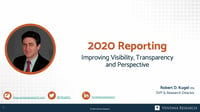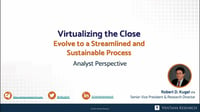In accounting terms, working capital includes current assets (short-term items such as cash, money due from customers and inventory) and current liabilities (typically payments due to suppliers and loan amounts that must be repaid within one year). Working capital management is a prime function of the finance organization, designed to balance often-conflicting objectives related to revenue, liquidity, risk and profitability. The basics of working capital management date back to ancient clay...
Read More
Topics:
Office of Finance,
CFO,
ERP and Continuous Accounting,
digital finance,
Purchasing/Sourcing/Payments,
Accounts Payable,
Treasury,
Accounts Receivable,
Working Capital
In the face of a very uncertain future, companies have been discovering the value of rapid planning and budgeting cycles. As events unfold, they’re changing expectations for the future significantly on a daily or weekly basis. However, even when the world returns to a steadier state, companies will benefit from making their planning and budgeting processes faster, easier, more relevant, more strategic, more agile and more accurate.
Read More
Topics:
Office of Finance,
IBP,
Business Planning,
CFO,
Integrated Business Planning
ESG reporting is a matter that organizations – and especially publicly held corporations – will be confronting over the next several years. Ventana Research asserts that by 2025, one-half of corporations with 1,000 or more employees will have a formal ESG reporting process in place to address legal mandates or shareholder demand. The roots of ESG investing go back many decades but it has gained significant attention recently as demand in the investment world for non-accounting measures to guide...
Read More
Topics:
FP&A,
Governance,
Office of Finance,
Performance,
Reporting,
CFO,
ESG
As a result of the rapidly changing business landscape in 2020 and the need to quickly – and intelligently – change business plans and budgets, many more companies have been deciding to adopt a continuous planning approach to be able to add speed and flexibility. Transforming how organizations plan and budget has become a top-of-mind issue for CFO and even CEOs. Ventana Research has been advocating what we call continuous planning to improve organizational performance. In this multimedia...
Read More
Topics:
FP&A,
Office of Finance,
budget,
CFO,
financial planning
Profitability management produces a sustainable competitive advantage but by 2025 only one-third of companies will have implemented a profitability management initiative, explains Ventana Research SVP and Research Director Robert Kugel. This brief video shows why FP&A organizations must be part of a profitability management approach to pricing and costing.
{% video_player "embed_player" overrideable=False, type='scriptV4', hide_playlist=True, viral_sharing=False, embed_button=False,...
Read More
Topics:
FP&A,
Office of Finance,
Sales Operations,
CFO,
Profitability,
Price and Revenue Management
In this Analyst Perspective from Robert Kugel, learn how FP&A can redefine its mission to achieve the long-stated goal of making it more of a strategic partner with the rest of the organization. This means fully adopting integrated business planning, a high participation, collaborative, action-oriented approach to planning and budgeting built on frequent, short planning sprints. Short planning cycles enable companies to achieve greater agility in responding to market or competitive changes, and...
Read More
Topics:
FP&A,
Office of Finance,
Budgeting,
Business Planning,
CFO,
financial planning,
forecasting
FP&A and business analysts can make reporting more effective by reimagining how, what and when their company does its reporting. They should provide the users of their reports the information they want in a form they want it. They should be thinking about how they can make reporting more effective by rethinking how data is presented, how interactive it is, and what visualizations are used. Rethinking how to combine narratives, data, charts and graphics to everyday communications. How to add...
Read More
Topics:
FP&A,
Office of Finance,
CFO,
Financial Performance Management,
financial reporting,
financial standards,
tax planning
Sometimes it takes a while for technology to fundamentally change how work is done. That’s because several innovations usually have to come together before a transformation can occur. For instance, Karl Benz created the first practical motorcar in 1885, but consumers would have to wait until the 1920s for the modern automobile. Computerized accounting systems originated in the 1950s but it’s only now that technologies have evolved and come together to fundamentally change how work is done.
Read More
Topics:
ERP,
Office of Finance,
close,
closing,
CFO,
controller,
Financial Performance Management,
ERP and Continuous Accounting
Sales plays a lead role in the revenue and growth of every organization. Whether the selling is direct or indirect, what happens in the sales department has ramifications that are perilous to underestimate. The imperative to maintain business continuity becomes painfully clear in a global pandemic, and that imperative demands that organizations cultivate sales excellence. This effort should start with leadership and engage sales operations, management and professionals with the objective of...
Read More
Topics:
Sales,
Sales Performance,
Sales Operations,
Business Continuity,
CFO,
Sales Performance Management,
sales enablement
The global pandemic crisis was, in effect, an unrehearsed stress test measuring the resiliency of the department. The crisis highlighted the importance of sustaining confidence in the accuracy and control of accounting processes, not just efficiency. Virtualizing the close means using technology to substantially reduce the amount of manual processing and paper involved needed to complete the accounting close. Finance and accounting organizations that can operate in a virtual mode are better...
Read More
Topics:
Office of Finance,
Continuous Accounting,
Fast close,
CFO,
Digital Technology



















